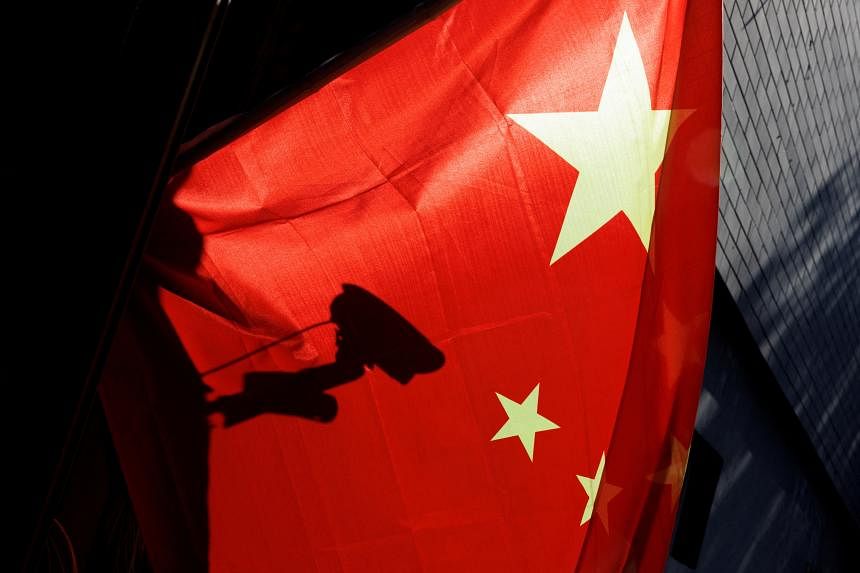SHANGHAI - Sports and travel influencer Jade Lin is used to getting censored.
The 42-year-old Shanghai-based former broadcast journalist, who has been running her channel since 2016, said she has received multiple warnings from Tencent’s WeChat and Sina Weibo for “violating” rules and regulations.
“It’s always the most innocuous of things that come out of nowhere, like certain words or phrases. There’s no actual list that exists online, so you really have to find out via trial and error,” she told The Straits Times.
China’s cyberspace regulator last week released new guidelines regulating “self media” – blogs and social media accounts – run independently of major media organisations.
Account holders will now be responsible for ensuring that posts are factual, and must clearly identify their sources when posting about current affairs or international politics.
Furthermore, those focused on finance, education, health and legal affairs should be “strictly reviewed” by Internet platforms, and the qualifications of those behind such accounts be prominently displayed.
“Self media” (or “zimeiti” in Chinese) is a loose term used to refer to non-institutional content providers on social media platforms like WeChat and Weibo.
According to a 2020 report on new media trends in China, a vast majority of consumers – about 80 per cent – turn to WeChat as a source of information, followed by Douyin, the Chinese version of TikTok, and Weibo, a Twitter-like microblogging site.
Just 6.1 per cent chose television as their primary source of news, while a mere 0.7 per cent chose traditional print media.
With a vast majority choosing public accounts on WeChat as their main source of information, an entire ecosystem of such outlets has mushroomed since Tencent first introduced the “public account” blogging feature in 2010.
This has led to state media outlets, including Xinhua, People’s Daily and various regional sites, starting their own accounts on WeChat.
Initially thought to be a way for more independent journalism, such public accounts have instead resulted in an overwhelmingly chaotic cycle of information with little regulation.
Mostly profit-driven, many of these accounts engage in disinformation or offer skewed versions of events.
This is because the zimeiti industry is young and has not developed a set of industry-wide ethics the way professional journalists have, wrote Chinese University of Hong Kong’s Assistant Professor Fang Kecheng in a paper on zimeiti in 2022.
“Zimeiti is an industry closely connected with and promoted by Chinese Internet companies, which are abundant in capital and have the tradition of following the commercial... logic,” he wrote.
College Daily, an online Chinese-language publication for Chinese students living in the United States, has about two million followers. It began as a how-to guide for students new to America. Over time, it started featuring Chinese news with nationalistic overtones and tabloid tales about Chinese living overseas.
A recent post about South Korea “butchering” its youth – referring to stiff competition driving young people to suicide – drew over 89,000 views, while a post about an artificial intelligence-generated Shanhe University got 91,000 views.
In Singapore, there are several such accounts catering to the Chinese diaspora, including Xinjiapo Yan (Singapore Eye), Xinjiapo Shicheng Lama (Singapore Lion City Hot Mama) and Xinjiapo Yezi (Singapore Coconut).
Xinjiapo Yan, which has the largest following among such platforms, offers news on Singapore as well as articles on immigration, housing and education in Chinese.
But it is a delicate dance when it comes to what topics or phrases to look out for in order to avoid getting censored.
For instance, Ms May Chen, 37, of Xinjiapo Shicheng Lama, said she hired lawyers in China to help prepare a list of banned words and phrases, resulting in a handbook for her team of 10 to use when preparing content in Singapore.
“We have an SOP (standard operating procedure) before putting up every post, and that includes checking for sensitive words that can lead to our posts getting suspended or taken down,” she said.
Previous incidents of getting censured led Ms Chen to hire the team of Chinese legal advisers, who she said came up with “close to 1,000” words and phrases.
Some of the terms she now avoids using include “overseas studies”, “migration” and “green card”.
Violations can result in posts being deleted, temporary suspension of account, or even a total ban from the platform.
Ms Chen’s account, which focuses mostly on parenting and education tips, also runs live streams and offline events.
But things can be trickier when blogging about politics and international affairs.
Chairman Rabbit, the pen name of Mr Ren Yi, the Harvard-educated grandson of a prominent Chinese politician, has garnered a massive following for reflecting nationalistic opinion while also incorporating liberal ideals held by many foreign-educated peers.
“He picks his battles to work around censorship and mainstream opinion,” wrote contributor Xu Tianyi on the China Talk newsletter, calling Mr Ren a “cosmopolitan patriot”.
But even prominent bloggers like Chairman Rabbit can be subject to controls by the platform.
While popular posts usually get between 80,000 and 90,000 views, Mr Ren’s pieces about artificial intelligence (AI) and the property market attract between 4,000 and 5,000 views. AI has been a touchy subject in China because of the lack of regulation in this area.
Yet for many in the zimeiti space, the new rules are not unlike what is already being enforced.
There is also a disparity between how online media and others like podcasters are being regulated, said Mr Yang Yi, who runs a podcast production house.
“For some reason, because we are considered a broadcast product, we are not being regulated by the Cyberspace Administration of China, but instead the broadcast authorities, who might not monitor us as closely as the Internet platforms,” he said.
“But the thing is, there have been many changes announced over the years at a macro level, but by the time it distils down to the individual accounts, it’s actually nothing much.”
Meanwhile, for Ms Lin, this is yet another sign of how Beijing is further stifling creativity in the media space.
“When I left the news industry, I no longer wanted to touch current affairs or politics, to avoid stepping on any more red lines, so I turned to sports and travel,” she said. “Now it’s starting to appear like everything is a red line, and there’s no space for true independence any more.”


